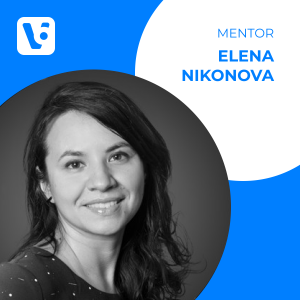 “Advising multiple companies gives you the ability to not just stay in your bubble but actually get exposed to multiple things.”
“Advising multiple companies gives you the ability to not just stay in your bubble but actually get exposed to multiple things.”
Meet Elena Nikonova, Senior Executive experienced in the development & implementation of Go2Market, Growth & Commercial strategies in Renewables, Clean Mobility and Infrastructure. As an ex-Chief Strategy Officer at a major EV charging public network and thanks to her continuous experience in Energy Multinationals and consulting, she is now sharing her knowledge as an Advisor and a Founder of Aftersun Consulting. Being lucky to have had Elena as a mentor, we couldn’t miss a chance to ask her a couple of questions.
7 min read
How did you start mentoring and how is this process going for you?
I’ve been working at corporates and scale-ups up until February this year. First at Roland Berger strategy consulting group, then at Shel Rechargel, EVBox and my last role was at a Charge Point Operator – Eleport backed by BOLT. When I left my last job, I wasn’t really sure if I wanted to get a full-time job again. I wanted to build something on my own while still staying in clean mobility and renewable space. So, I thought one of the ways, is to be an advisor for companies that are going through an energy transition.
In this journey, I had to learn a lot. I had to adjust to not getting a paycheck every month. Navigating this through was a little bit challenging. But what I learned, and maybe something that I can advise somebody who’s starting out, is to talk to as many people in your field as possible without actually expecting to land your project right away. Talk to as many people as possible and then somehow things will work out.
That’s interesting. Usually, entrepreneurs engage a lot with advisors, but they may not think that uncertainty is something they also navigate.
Yes, especially when you’ve been working in a full-time role all the time, it’s an adjustment you have to make to find your projects and rely only on yourself.
“ There’s actually a very good book… about footprint in general. It’s called “Hidden Impact”, written by Babette Porcelijn.“
What was the motivation to leave the corporate world?
That’s a good question. I just wanted to be fully independent. I’m also a very project-oriented person, so I find an operational type of work less rewarding in general. So helping startups on an ongoing basis and having variety is another thing. When you’re working for a company, you cannot work for other companies, right? Advising multiple companies gives you the ability to not just stay in your bubble but actually get exposed to multiple things.
How come they clean mobility and renewables?
When I was in strategy consulting, I didn’t really see that I was making a real impact. At the same time, I wanted to do something in sustainable energy. And then, by chance, somebody suggested that I talk to an EV company called NewMotion at that time, which later got acquired by Shell. It was an e-mobility company so from then on it was quite easy to transition to ENGIE and on, as there’s a lot of demand because e-mobility is still a very much growing field.
There is still a lot of uncertainty about the field and it’s also pretty complex for the general public. Are there any resources you would suggest to get educated about e-mobility and sustainable transition?
There’s actually a very good book that I really like. It’s not necessarily about e-mobility, it’s about sustainability and footprint in general. It’s called “Hidden Impact”, written by Babette Porcelijn. She writes about such things as, often when we, for example, buy a bottle of water, we only think that the footprint is just plastic production. However, that’s only a part of the footprint. Because the bottle has to be manufactured, transported, etc. What I mean is that we often don’t see the whole supply chain. So, in relation to EVs, she also actually calculated the footprint of cars and showed that an EV car has on average about 30% – 40% less footprint than a diesel car.
Then there are obviously a lot of resources on EVs in general, like electrek.co for example. The one that I read quite often and which I find really interesting is inside.com and its transportation newsletter. it has exciting news on all things like clean transportation, not just EVs, but air mobility, rail, trucks, etc. and I find that resource very easy to read. It’s definitely for a general audience.
How do you see the transportation of the future? Do you believe and advocate for a 100% EV transition or there is space for options like hydrogen or even diesel?
So just to make a comment on hydrogen, I think it’s a great option to use hydrogen-related technologies for storage and it makes sense for any kind of long-distance travel like truck transportation. However, it’s extremely expensive and most of the time, we don’t travel as much as we think we do.
I would like to see no diesel vehicles. As I said, it’s scientifically proven that the CO2 impact is much greater than that of EVs. I would like to see predominantly EVs on the road, with the condition that we also transition to sustainable energy. Otherwise, it doesn’t really make sense if you’re using an EV if you are charging EVs with coal fuel.
Maybe as a last comment, I’d like to see fewer cars on the roads and more efficient shared mobility solutions.
” The example of Norway and The Netherlands shows that, without subsidies, it’s really hard to transition to EVs because of that cost barrier of entry.“
Speaking of countries, what would you name an example of a really good effort?
The obvious answer is Norway. I would say Norway and the Netherlands. Their example shows that, without subsidies, it’s really hard to transition to EVs because of that cost barrier of entry. It’s a pretty expensive thing to buy, right? So even if you compare Norway, which was, I think, the first to introduce subsidies, versus a neighbouring country, Denmark, Denmark is behind because the subsidies were introduced much later.
Could you specify what those are?
Incentives like a lump sum or a tax break that they give you when you buy an electric vehicle. That kind of thing.
I have noted that you’re located in Portugal. How are they doing in terms of mobility?
There are maybe two companies that are related to electric mobility. They’re pretty big, but otherwise, there aren’t that many things going on here in the space of mobility.
The biggest problem in Portugal is the grid. For example, if we talk about EV chargers, you can’t just install a charger here. There’s a significant problem with energy capacity. That’s why the energy transition in Portugal will take a really long time because the whole energy system needs to be retrofitted.
Coming back to your consulting career, tell us more about your future plans and how companies can benefit from your services.
I’m currently consulting a couple of companies. They’re all connected to e-mobility and energy and I would love to continue in that field.
In general, I help with go-to-market strategy, i.e. expansion to new markets, product strategy, and sales traction.
I would love to continue doing that for some time, and then, eventually, settle in with one or two companies on a longer term. I think consulting for me was a good way to get exposed to many fields and different companies to know and be able to identify exactly what I want to do and where I want to sell.
My last question would be: What do you think about volvero?
I think it’s a really cool idea. I’m a fan of the sharing economy in general. Though, I don’t know if that’s feasible, it would be cool if there was a way to retrofit the car somehow to be able to unlock it remotely so that you don’t have to actually meet in person. That’s something that I would love to see in the future.
You’re absolutely right and it’s in the plans. Right now, to build trust among users we find it pretty useful for them to meet.
Oh, really? That’s interesting that people trust their houses, but not cars.
Well, it is changing but there is still a way to go and volvero is on a mission to change the way people see sharing economy.
Ekaterina Efimova @volvero



